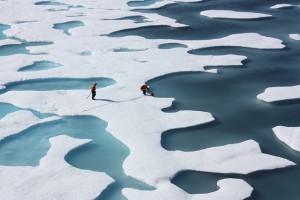Search Results for Tag: report
WWF: We just halved the world’s vertebrate population

It’s not only the world’s population of
birds that has dropped massively over the last 40 years. Photo: Rob Williams
Humankind needs to rethink its way of living and consuming the world’s resources immediately. That’s the bottom line of the latest Living Planet Index, presented by the World Wildlife Fund today in Berlin. Over just four decades we managed to reduce the size of the world’s populations of fish, birds, mammals, amphibians and reptiles by 52 percent. That’s a lot faster than previously thought, according to the WWF.
The report that is published every two years also says that our demands at the moment are 50 percent above what nature can bear. We cut down too many trees, use too much fresh water and emit carbon dioxide at an unsustainable rate.
The biggest declines of vertebrate wildlife was found in tropical regions, especially Latin America, the report finds. The dramatic numbers result from a change in the available information that went into the report. Two years ago the WWF talked about a decline of 28 percent in the time period from the 1970s until 2008, because the report relied on readily available information mostly from North America and Europe. Today the Living Planet Index is based on trends from around the world in a total of 10,380 populations of 3,038 mammal, bird, reptile, amphibian and fish species.
The main reasons for the massive decline are clear, states the report: the loss of natural habitats, overexploitation through hunting or fishing and climate change.
However, WWF International Director General Marco Lambertini strikes a hopeful note: it’s not too late to “develop sustainably and create a future where people can live and prosper in harmony with nature.”
Scientists more certain humans cause global warming
A much-awaited United Nations report on the science behind climate change says scientists are 95 percent sure that humans are the “dominant cause” of global warming since the 1950s. The document, which is meant to serve as a guideline for policymakers to shift towards greener energies, warns that the impact of greenhouse gas emissions could linger for centuries.
The report by the Intergovernmental Panel on Climate Change (IPCC) is considered the most comprehensive document on our understanding of the mechanics of a warming planet and the physical evidence behind it.
The following are the main findings of the report:
- Global warming is “unequivocal,” on the ground, in the air and in the oceans. And It’s “extremely likely” or 95 percent likely that human activities, led by the burning of fossil fuels, are the main cause of a rise in temperatures since the 1950s.
- Concentrations of carbon dioxide and other greenhouse gases in the atmosphere have increased to levels that are unprecedented in at least 800,000 years. The burning of fossil fuels is the main reason behind a 40 percent increase in C02 concentrations since the industrial revolution.
- Short, individual periods, such as 1998, which was an unusually warm year, are influenced by natural variability and are not an indicator of long-term climate trends.
- Global temperatures are likely to rise by 0.3 to 4.8 degrees Celsius, or 0.5-8.6 Fahrenheit, by the end of the century depending on how much governments control carbon emissions.
- Sea levels are expected to rise a further 10-32 inches (26-82 centimeters) by the end of the century. That will pose a threat to coastal cities from Shanghai to San Francisco.
- The Greenland and Antarctic ice sheets have been shrinking over the past two decades. Glaciers have continued to melt almost all over the world. Arctic sea ice has shrunk and spring snow cover has continued to decrease, and it is “very likely” that this will continue.
Melt!
Melt! is Europe’s largest indie and electro music festival. Taking place in July every year, the 2011 installment saw 150 DJs and bands perform in front of a 20,000 strong crowd. When the music plays the heat is on. That’s not always a good thing: instruments, lighting, logistics plus thousands of fans camping out on site are gobbling up huge amounts of energy. The CO2-emissions of the 3-day event are on a par with that of a small town. But this year climate protection is part of the act. Find out how in our latest GI report.
In addition here are interviews on the issue with some of the artists. Daniel of projecthires.com has quizzed the Melt!-line up about climate change and the need for action.
Click here for more of Daniel’s video interviews.
Taking Back the Forest
 Are forests back on the rise? The latest study from the UN Food and Agriculture Organization (FAO) shows the rate of forest loss is actually slowing down, surprisingly enough. That's mainly thanks to a push to plant–rather than cut down–forests in Asia.
Are forests back on the rise? The latest study from the UN Food and Agriculture Organization (FAO) shows the rate of forest loss is actually slowing down, surprisingly enough. That's mainly thanks to a push to plant–rather than cut down–forests in Asia.
According to the State of the World"s Forests 2011 report, the rate at which the planet's forests are being cut down decreased from 8.3 million hectares a year between 1999-2000 to just 5.2 million over the last decade. And, the UN says the world's forest regions could even start expanding in the near future!
China has focused on a big reforestation project, which includes increasing the country's forested land area from 120 million to 200 million hectares. There's just one small problem, according to the FAO: a lot of that new growth will likely be "junk" forestation because it won't have the same carbon storage value as existing forests. Plus, a lot of valuable forest land is still being razed at a very high rate in South America and Africa.
What about in your region? Is your home country planting or cutting down–and have you noticed any changes?





Feedback